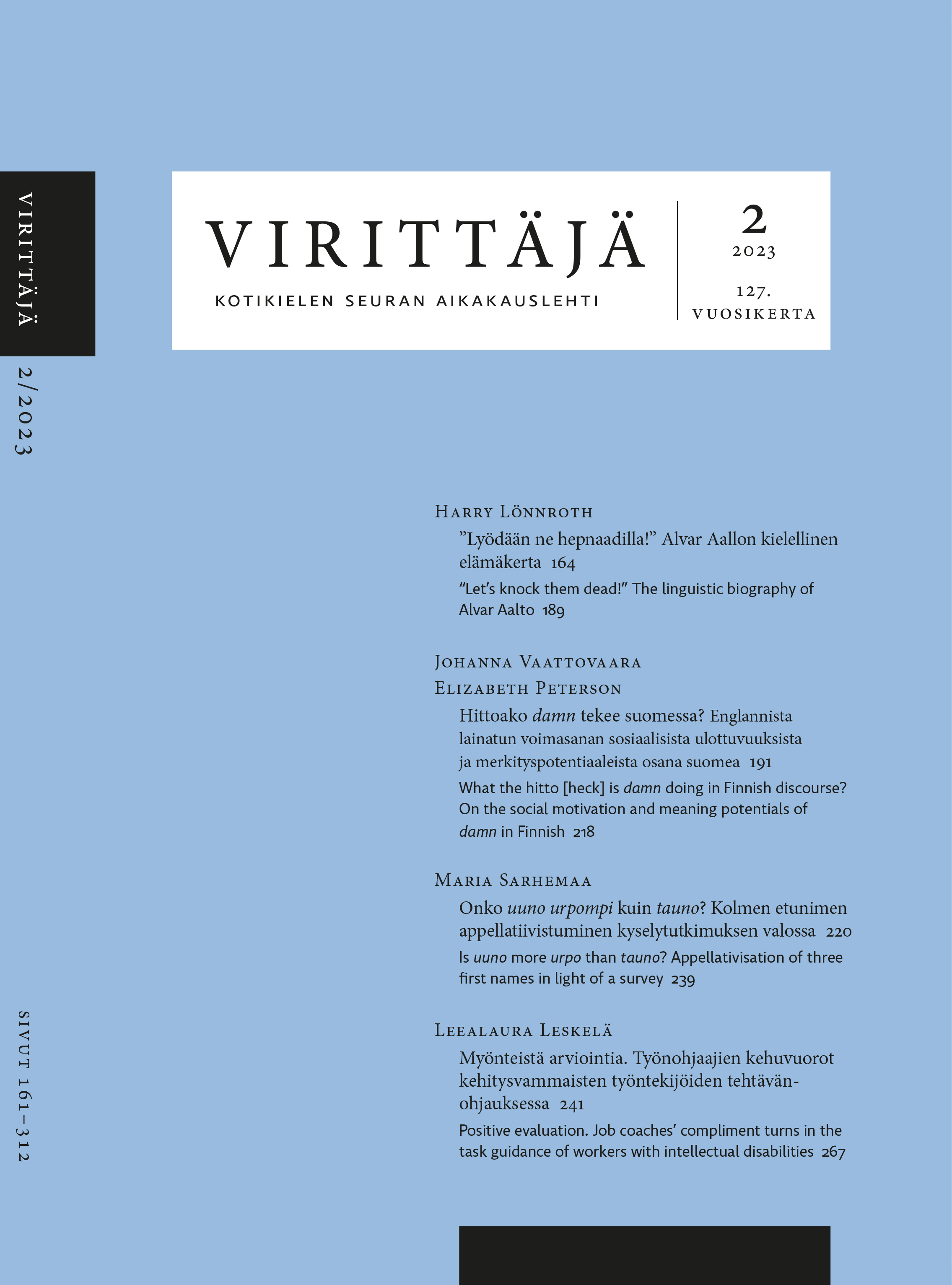Onko uuno urpompi kuin tauno?
Kolmen etunimen appellatiivistuminen kyselytutkimuksen valossa
Abstrakti
Artikkeli käsittelee miehennimistä appellatiivistuneita ilmauksia tauno, urpo ja uuno, jotka kaikki tarkoittavat puhekielessä muun muassa ’tyhmää’. Tutkimusaineisto on kerätty verkkokyselyllä, ja tuloksia verrataan tutkijan aikaisempaan korpusaineistopohjaiseen tutkimukseen.
Artikkelissa tarkastellaan sitä, mitä tutkitut ilmaukset tarkoittavat ja mitä niistä käytetään erilaisissa lausekonteksteissa, sekä sitä, mikä ilmauksista on pejoratiivisin ja mikä vähiten pejoratiivinen. Lisäksi tutkimuksessa selvitetään kognitiivisen semantiikan analyysivälineitä hyödyntäen, millaisia ovat prototyyppiset ja epäprototyyppiset taunot, urpot ja uunot.
Tutkimus osoittaa, että sekä urpo että uuno merkitsevät ensisijaisesti ’tyhmää’. Urpo ärsyttää tahallaan, kun taas uuno hölmöilee ajattelemattomuuttaan. Niinpä prototyyppinen urpo on paitsi ’tyhmä’ myös muun muassa ’huonosti käyttäytyvä’ ja uuno ’hidasälyinen’. Epäprototyyppisesti taas urpo on esimerkiksi ’röyhkeä’ ja uuno ’hajamielinen’. Tauno on ensisijaisesti ja prototyyppisesti ’tavallinen ihminen’ mutta myös ’tyhmä’. Taunon tyhmyys on hyväntahtoista ja tahatonta. Epäprototyyppisesti tauno on myös ’maalainen’. Näiden merkitysten muodostumisessa hyödynnetään erilaisia kognitiivisia alueita.
Lisäksi tutkimuksesta selviää, että itseen viitataan tyypillisesti uunolla, kun taas toista solvataan urpolla ja taunoa käytetään puhuttaessa ’tavallisesta ihmisestä’. Ilmauksista pejoratiivisin on urpo, toiseksi pejoratiivisin uuno ja vähiten pejoratiivinen tauno. Uunon ja taunon välinen ero pejoratiivisuudessa ei ole kuitenkaan yhtä jyrkkä kuin uunon ja urpon välinen.
Is uuno more urpo than tauno? Appellativisation of three first names in light of a survey
The article focuses on the expressions tauno, urpo and uuno, appellativised Finnish male names which all carry the meaning ‘stupid’ in colloquial language. The data is compiled from an internet survey, and the results are compared with a previous corpus-based study carried out by the same researcher.
The article discusses what these expressions mean and how they are used in different contexts. It also discusses which of the expressions is the most and which the least pejorative. In addition, the study uses the methods of cognitive semantics to establish what the prototypical and less prototypical tauno, urpo and uuno are like.
The article shows that both urpo and uuno primarily mean ‘stupid’. An urpo is intentionally provocative, whereas an uuno acts foolishly and inconsiderately. Therefore, the prototypical urpo is not only ‘stupid’ but also ‘badly behaved’, whereas uuno is ‘slow-witted’. Less prototypically, urpo is ‘shameless’ and uuno ‘absent-minded’. A tauno is primarily and prototypically ‘ordinary’ but also ‘stupid’. The stupidity of a tauno is well-intentioned and unintentional. Less prototypically, a tauno is also a ‘country bumpkin’. Various cognitive domains are required to form these meanings.
The study also illustrates that uuno is usually used when speakers refer to themselves, whereas urpo is used for abusing others and tauno when speaking about ordinary people. The most pejorative of the three is urpo, the second most pejorative is uuno and the least pejorative is tauno. However, the distinction in pejorative degree between uuno and tauno is not as marked as it is between uuno and urpo.






